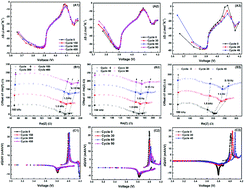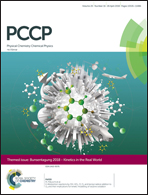Degradation of thin-film lithium batteries characterised by improved potentiometric measurement of entropy change
Abstract
The degradation phenomena of thin-film solid state batteries caused by cycling at a high cut-off voltage and different temperatures were studied using an improved potentiometric measurement of entropy change combined with electrochemical impedance analysis and incremental capacity analysis. Entropy profiling is demonstrated as a viable non-destructive technique for solid state batteries that is sensitive to structural changes in electrodes during galvanostatic cycling, and is complementary to other techniques for studying degradation. The characteristic peaks and valleys in the entropy profile as a function of the state-of-charge could be closely correlated to theories of phase transitions in the cathode material. This technique is therefore a useful technique to help understand and diagnose the degradation mechanism, and specify the state-of-health in a promising new battery technology.



 Please wait while we load your content...
Please wait while we load your content...